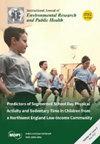关于劳动力中的非传染性疾病对中低收入国家全球和平与安全的威胁的范围审查
3区 综合性期刊
Q1 Medicine
International Journal of Environmental Research and Public Health
Pub Date : 2024-08-29
DOI:10.3390/ijerph21091143
引用次数: 0
摘要
非传染性疾病(NCDs)继续对公众健康构成威胁。尽管人们广泛认识到非传染性疾病对劳动力的影响,但仍需要更多地了解非传染性疾病如何影响和平与安全,尤其是在中低收入国家。为了解决这个问题,我们进行了一次范围界定审查,并提出了一份说明,以探讨劳动力中的非传染性疾病如何威胁和平与安全。在筛选出的 570 篇论文中,有 34 篇符合研究标准,其中包括 26 篇同行评审文章和 8 篇灰色文献。我们的研究结果表明,虽然没有研究得出低收入和中等收入国家劳动力中的非传染性疾病与和平与安全之间存在直接关系,但一些研究表明,一方面非传染性疾病与经济增长之间存在关系,另一方面经济增长与和平与安全之间也存在关系。因此,以经济增长为近因,我们的研究结果显示了劳动力中的非传染性疾病与和平与安全之间的三条联系途径:(i) 非传染性疾病导致生产率低下和经济增长乏力,从而威胁到公共和平与安全;(ii) 劳动力中的非传染性疾病会导致长期护理需求,从而对公共资源造成压力,并对和平与安全方面的公共支出产生影响;(iii) 照顾患有非传染性疾病的家庭成员的家庭支出会破坏家庭稳定,并造成威胁和平与安全的不利条件。这项研究强调了非传染性疾病对健康和安全的双重威胁,因为它们影响到对和平与安全至关重要的人力资源和社区结构。研究结果强调了将工作场所视为非传染性疾病预防战略环境的重要性,这将对经济增长以及和平与安全产生长期影响。本文章由计算机程序翻译,如有差异,请以英文原文为准。
A Scoping Review of Non-Communicable Diseases among the Workforce as a Threat to Global Peace and Security in Low-Middle Income Countries
Non-communicable diseases (NCDs) continue to pose a threat to public health. Although their impact on the workforce is widely recognized, there needs to be more understanding of how NCDs affect peace and security, particularly in low-middle-income countries. To address this, we conducted a scoping review and presented a narrative to explore how NCDs in the workforce threaten peace and security. Out of 570 papers screened, 34 articles, comprising 26 peer review and 8 grey literature, met the study criteria. Our findings reveal that while no study has drawn a direct relationship between NCDs in the workforce in LMICs and peace and security, several studies have demonstrated a relationship between NCDs and economic growth on one hand and economic growth and peace and security on the other. Therefore, using economic growth as a proximal factor, our findings show three pathways that link NCDs in the workforce to peace and security: (i) NCDs lead to low productivity and poor economic growth, which can threaten public peace and security; (ii) NCDs in the workforce can result in long-term care needs, which then puts pressure on public resources and have implications for public expenditure on peace and security; and (iii) household expenditures on caring for a family member with an NCD can destabilize families and create an unfavourable condition that threatens peace and security. This research highlights the dual threat of NCDs to health and security, as they impact human resources and community structures crucial for peace and security. The results underscore the importance of considering the workplace as a strategic setting for NCD prevention, which will have long-term implications for economic growth and peace and security.
求助全文
通过发布文献求助,成功后即可免费获取论文全文。
去求助
来源期刊

International Journal of Environmental Research and Public Health
Medicine-Public Health, Environmental and Occupational Health
CiteScore
7.30
自引率
0.00%
发文量
14422
审稿时长
1 months
期刊介绍:
International Journal of Environmental Research and Public Health (IJERPH) (ISSN 1660-4601) is a peer-reviewed scientific journal that publishes original articles, critical reviews, research notes, and short communications in the interdisciplinary area of environmental health sciences and public health. It links several scientific disciplines including biology, biochemistry, biotechnology, cellular and molecular biology, chemistry, computer science, ecology, engineering, epidemiology, genetics, immunology, microbiology, oncology, pathology, pharmacology, and toxicology, in an integrated fashion, to address critical issues related to environmental quality and public health. Therefore, IJERPH focuses on the publication of scientific and technical information on the impacts of natural phenomena and anthropogenic factors on the quality of our environment, the interrelationships between environmental health and the quality of life, as well as the socio-cultural, political, economic, and legal considerations related to environmental stewardship and public health.
The 2018 IJERPH Outstanding Reviewer Award has been launched! This award acknowledge those who have generously dedicated their time to review manuscripts submitted to IJERPH. See full details at http://www.mdpi.com/journal/ijerph/awards.
 求助内容:
求助内容: 应助结果提醒方式:
应助结果提醒方式:


